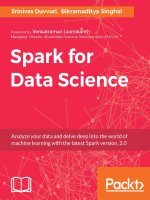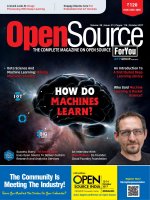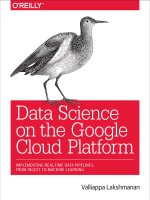Resources for learning data science (current jan 2021)
Bạn đang xem bản rút gọn của tài liệu. Xem và tải ngay bản đầy đủ của tài liệu tại đây (196.23 KB, 2 trang )
Resources for learning data science
I ended up answering questions like this so many times that I made it into a resource I can link
instead. I am on various Data Science forums as Andrew Owens
(
/>
/>
This list is not complete in any way. I have no association with any of the content creators linked
here. I am happy for people to share it.
Key elements
•
•
•
•
•
Data science “thinking” – understanding data, how and from where it is collected, how and
where it is stored and accessed (eg databases, data centres, streams/lakes), and most
importantly the limitations and hazards.
Statistics and statistical thinking – the science of uncertainty.
Linear algebra – the theoretical building blocks of machine learning.
Machine learning methods and their implementations (R and Python)
Visualisation of the outcomes (there are entire books and courses on this)
ISLR7
To start with, this is probably one of the best resources available in this field for starting learners.
James, Witten, Hastie and Tibshirani. (2013, 7th printing) “An Introduction to Statistical Learning with
Applications in R”. Often referred to as “ISLR7” on data science FB groups.
•
•
•
The book itself is available from />Video course by two of the authors: />Unofficial solutions to the back of chapter questions - />
I suggest for the best learning opportunity, watch the videos for each chapter, then read the
chapter, then do the exercises and check against the solutions to see how you did or how you could
improve your answers.
YouTube courses
A/Prof Arti Ramesh has done a 67 video YouTube series with a more mathematical focus:
/>A friend who works in the field recommended this one to me and said it helped at his internship:
/>Joseph B. Rivera has created a number of free resources at
/>
Udemy courses
Udemy is an online marketplace for courses – they can be of varying quality but some are excellent
and they have really helped me in my own learning. Once you buy the course, you have lifetime
access to its materials. They have regular specials where the prices for most courses come down to
$10-$15.
•
•
•
Jose Portilla – – One of the
best Udemy DS trainers with a course that assumes literally nothing and helps you learn
Python. It’s sometimes referred to as the “Zero to Hero” course.
Jose Portilla – – Once you have done the previous course, this one applies it to Data Science
and teaches you a lot of the methods.
Kirill Eremenko – and
– Another very good trainer, though I
suggest doing Portilla’s first then doing these ones. The latter course covers neural
networks, which ISLR doesn’t touch.
A tip regarding statistics
Econometrics textbooks often have a very good primer on statistics and basic linear algebra – usually
in an appendix or introductory chapter. The best I have found is in Gujarati’s “Basic Econometrics”
(2003 or 2009 editions), but any good textbook (Maddala, Wooldridge, Carter-Hill etc) will have
similar content. Furthermore, the actual content of the books goes into linear estimators,
heteroskedasticity (uneven variance) etc in much better detail than traditional statistics textbooks.
Many university libraries have these on shelf (Dewey code 330.015) – you do not need to be a
student there to simply read the books as opposed to borrowing them.
Additionally, I found this guy’s YouTube channel extremely good at explaining econometrics, for
those who want to do a deeper dive: />
Books
•
•
•
•
Elements of Statistical Learning - />Bishop, C. (2006). Pattern Recognition and Machine Learning. Springer
Sharda, R. (2018). Business Intelligence, Analytics and Data Science: A Managerial
Perspective
Stinerock, R. (2018) Statistics with R: A Beginners Guide. SAGE.
Other courses
One that a lot of people recommend, but it's not cheap compared to the above options, is Andrew
Ng's Coursera course on machine learning. I haven't tried it personally, but enough people I trust
swear by it that I'll include it here. You can find this at />









